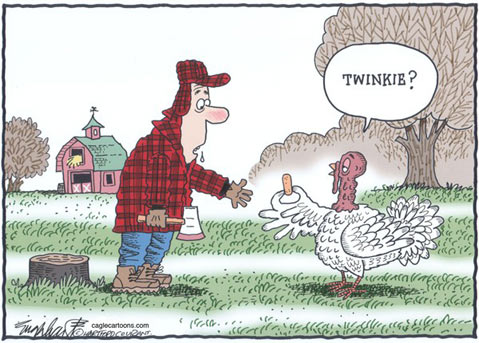Food Season

Fall is in the air … and so is food. For compulsive eaters fall marks the start of “food season” — indeed it’s a veritable food triathlon — Thanksgiving, Hanukkah, and Christmas, with Halloween as a prerace trial and New Year’s Eve the bubbly finale. For compulsive eaters the change in seasons is both wondrous and daunting, filled with holiday cheer; bustling with cooking, baking, and cleaning; shopping, visiting, and celebrating. Everywhere we turn there will be cinnamon, vanilla, allspice: pies wafting out of ovens, neighbors dropping by with cookies, and always — always — the ubiquitous office candy box.
Years ago I heard a woman call the Dr. Dean Edell radio show, asking for help with her “Seasonal Appetite Disorder.” After a polite chuckle, Dr. Edell explained she meant Seasonal Affective Disorder. Whatever. Compulsive eaters know exactly what she’s talking about. Office-bound on winter days till the sun is long gone, we fantasize about tropical getaways — or coconut cream pies. And if we happen to miss our workout, we’re less likely to walk the dogs on a dark and stormy night. Sure, there are tread climbers and spin classes and turbo-kick-aerobic DVD sets; there are also kids to feed, homework, chores, and baths. As the days grow shorter it seems the opportunity to overeat far exceeds the time to exercise.
The rub is that compulsive eaters, unlike substance users, can’t “just say no.” We can’t stop eating; we love winter holidays, too. And when it comes to holiday gatherings, compulsive eaters get no respect. Ironically, if we’ve maintained a healthy weight (after years of trial and error), passing up gooey goodies nets us remarks like “What do you have to worry about?” Compounding our dilemma is the risk of offending party hosts — a risk that helps us rationalize having just one. Yet no one plops an icy drink in front of a recovered alcoholic and says, “Go ahead, have just one.” No one leaves Jack Daniels in the work kitchen to share.
In college I was struck when a marketing instructor pointed out that advertising aimed at women targets two fundamental concerns: are you beautiful enough and are you nurturing enough. (Ideally, you’re both.) Consider those annoying Dove Bar commercials where a Victoria’s Secret lookalike ravishes a Dove Bar almost as ravishing as she is. Juxtapose her against apron-clad Betty Crocker (or Julia or Martha), sweating over a hot oven, cooking yams, stuffing, and gravy. Cut from the heat of the kitchen to the cool of a cocktail party and those slinky little black dresses that all women look great in — right?
It’s enough to make mere mortals scream — or eat.
Some of you are above all this sturm und drang, and more power to you. For the rest of us there is solace in knowing we’re in good company. Now that binge eating disorder is an official diagnosis in the DSM-5, we just might get some respect. Books on emotional/compulsive overeating abound, but David Kessler, a Harvard-trained doctor and lawyer, adds science to the mix, recounting his own struggle with food in The End of Overeating: Taking Control of the Insatiable American Appetite.
Dr. Kessler, who took on Big Tobacco as the commissioner of the Food and Drug Administration, asserts that hyperpalatable foods are altering the biological circuitry in our brains. He says the food industry exploits this neurological response, designing foods to induce people to eat more than they should, a phenomenon he calls “conditioned hypereating.” For many, it turns out, the Lay’s Potato Chips’ slogan “Betcha can’t eat just one” is scientifically accurate. He sees parallels between hyperpalatable foods and drugs of abuse, and it’s hard to argue his point given the current obesity crisis.
So what’s one to do? Hole up for the winter, find a cave, and hibernate? Or dig in, metaphorically speaking, and learn healthier ways to eat, drink, and be merry? Along with what to eat, compulsive eaters must explore the all-important why. For many, eating is a way to soothe — indeed, food is the substance most readily available to children. Compulsive eating often takes root in childhood trauma, masking emotions too difficult to bear. As adults, eating becomes our “designated issue,” distracting us from deeper concerns: relationship struggles, anxiety, or depression. Diets help us change our bodies, but they leave us stranded with the same emotions and urges to eat. Until compulsive eaters understand what drives their out-of-control cravings and learn healthier ways of managing emotions, maintaining weight loss is precarious at best.
On Mondays, a workshop designed to address compulsive eating is being offered by Laura Hout and Full Spectrum Recovery & Counseling. “Beyond Overeating” will examine binge eating disorder, junk food science, and happy holiday eating strategies. Participants will practice researched-based methods for overcoming compulsive eating using techniques gleaned from Dr. Judith Beck, Dr. David Kessler, and author Geneen Roth. For more information contact Laura Hout at (805) 403-9585 or laurahout1@gmail.com.
Laura Hout, MA, MFT intern, specializes in treating compulsive eating and compulsive use disorders. For more information, see beyondovereating.com.



